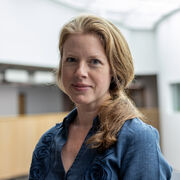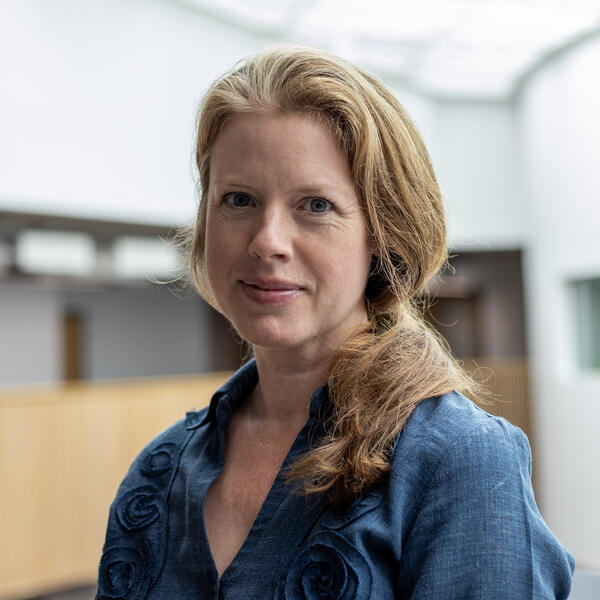Dr Pamela Richardson
School of Geography and Planning
Marie Sklodowska-Curie Fellow


Full contact details
School of Geography and Planning
Geography and Planning Building
Winter Street
Sheffield
S3 7ND
- Profile
-
Pamela Richardson joined the University of Sheffield in 2020 after winning ESRC IAA funds to implement a 12-month innovative Knowledge Exchange Project. She follows on this with a Marie Sklodowska-Curie Individual Fellowship, which will run until 2026.
Pamela studied Geography at the Universities of Edinburgh and Oxford. She completed her Doctorate at the University of Oxford (Centre for the Environment) in 2009 under the supervision of Sarah Whatmore and Colin Clarke. Her DPhil research explored the more-than-human and postcolonial ethics and politics of Caribbean sugar during the demise of the EU Sugar Regime and drew upon a diverse set of ethical philosophies, qualitative research methods and empirical data.
Pamela was awarded an Andrew Mellon Fellowship at the University of KwaZulu-Natal (South Africa) (2010-11) and a Postdoctoral Research Fellowship at the same institution (co-hosted by the School of Development Studies and the Centre for Civil Society) (2011-14), where she was involved with a wide range of community engagement activities. During this time, she undertook action research in Zimbabwe and also won an Antipode Scholar-Activist award for her work with participatory video, sustainability studies and youth. In 2014, she joined the German Institute for Tropical and Subtropical Agriculture (DITSL) as a Research Fellow and task leader. There, she co-designed participatory methodologies to support innovation processes within the frame of an international Agricultural Research for Development project in Tanzania, whilst analysing socio-cultural issues and inclusion/exclusion factors.
Pamela is also an experienced Participatory and Community Video Facilitator, group process facilitator, videographer and online learning coach. She has worked as a consultant in these various capacities with the UNDP, the Institute for Development Studies, the Centre for Poverty, Land and Agrarian Studies, the Tudor Trust, Danish Church Aid, and the Seed and Knowledge Initiative. With a commitment to deepening cross-sector skills and collaborations, she spent 2019-20 training to become a Certified Generative Facilitator; she also has experience in the arts, educational work, and community activism. She is passionate about applying knowledge to support transformations towards a fairer, healthier, and more sustainable world.
- Research interests
-
Identifying as a transdisciplinary scholar, a critical geographer and a feminist political ecologist, Pamela is interested in the co-emergence of new social and material worlds, particularly in contexts where justice and sustainability issues are at stake and where communities are intentionally co-creating change. Her work engages with food geographies, political ecology, feminist theory, diverse economies, and critical development studies.
Pamela is currently leading an ESRC IAA-funded action research and innovation project hosted by the Institute for Sustainable Food called "Make it grow: supporting community-based food initiatives to access grants through participatory video proposals". This one-year Knowledge Exchange project will work to create learning opportunities and tools for food-focused, community-based organisations to build their video-making capacities, particularly for the purpose of creating participatory video proposals. At the same time, she is working with donor institutions to support and pilot the integration of video proposals into their application processes.
Pamela has been awarded a Marie Sklodowska-Curie Individual Fellowship (2021-26) to undertake research for her project, "Co-creating multi-scalar generative change towards sustainable food systems: learning with communities of practice in Zimbabwe and the UK". Key questions driving this research are (1) “How does transformation towards more sustainable food systems take place, across different scales from the individual, to the community, to the regional, to the international?” (2) “What are the socio-ecological, economic, political and institutional factors that enable the co-creation of change towards more sustainable food systems?” (3) “How can facilitators, researchers and policy-makers support the co-creation of change processes, across different scales, to allow more sustainable food systems to emerge?”
Following doctoral training in Geography at Oxford focusing on hybrid geographies and the Caribbean sugar economy, Pamela undertook postdoctoral research in Zimbabwe, South Africa and Tanzania, exploring community-based resilience, innovation and sustainable food strategies with critical analysis of socio-cultural, political and socio-environmental relations. Her work has consistently engaged with ethical issues and the politics of knowledge production; she has developed highly innovative modes of enquiry, including video methods, which have sought to deepen attention to situated knowledges, embodied practices and more-than-human, ecological agencies. Her methodological expertise include: qualitative research design; participatory video facilitation; multimedia skills (with several public-oriented online resources produced); ICT4D; and participatory action research methods.
- Publications
-
Books
- Make it Grow Facilitation Toolkit: Supporting Community Groups to Create Participatory Video Proposals. University of Sheffield.


- Co-Creating Sustainable Food Systems - Learning with Communities of Practice in Zimbabwe. University of Sheffield.


- Participatory Video as a Method for Participatory Research and Community Engagement. Kassel, Universität Kassel, Fachbereich Gesellschaftswissenschaften: University of Kassel.


Journal articles
- Evaluating a women's digital inclusion and storytelling initiative through the lens of empowerment. Digital Geography and Society, 7. View this article in WRRO


- Development beyond 2030: more collaboration, less competition?. International Development Planning Review, 46(2), 227-242. View this article in WRRO


- Disrupting patterns at the end of an agricultural research project: experiences with community cinema and participatory video. GeoHumanities, 9(1), 273-285. View this article in WRRO


- Participatory video (remote, online): participatory research methods for sustainability ‐ toolkit #2. GAIA - Ecological Perspectives for Science and Society, 31(2), 82-84. View this article in WRRO


- Everyday political geographies of community‐building: exploring the practices of three Zimbabwean permaculture communities. Environmental Policy and Governance, 31(3), 211-222. View this article in WRRO


- Experience with participatory video proposals: assisting community organisations with innovation project planning. Development in Practice, 29(6), 808-816. View this article in WRRO


- Participatory video proposals: a tool for empowering farmer groups in rural innovation processes?. Journal of Rural Studies, 69, 173-185. View this article in WRRO


- Multi-Disciplinary North-South Collaboration in Participatory Action Research on Food Value Chains: a German-Tanzanian Case Study on Perceptions, Experiences and Challenges. Systemic Practice and Action Research, 32(4), 359-378.


- Participatory problem analysis of crop activities in rural Tanzania with attention to gender and wealth: ‘setting the scene’ to enhance relevance and avoid exclusion in pro-poor innovation projects. Food Security, 10(4), 859-880. View this article in WRRO


- Aid for Trade and African agriculture: the bittersweet case of Swazi sugar. Review of African Political Economy, 41(140).


- Performing a more-than-human material imagination during fieldwork: muddy boots, diarizing and putting vitalism on video. cultural geographies, 21(2), 293-299.


- Situated knowledge and the
EU sugar reform: a Caribbean life history. Area, 45(2), 188-197.

- Cut Loose in the Caribbean: Neoliberalism and the Demise of the Commonwealth Sugar Trade. Bulletin of Latin American Research, 32(3), 263-278.


- Documentary film and ethical foodscapes: three takes on Caribbean sugar. cultural geographies, 20(3), 339-356.


- Negotiating Fairness in the EU Sugar Reform: The Ethics of European-Caribbean Sugar Trading Relations. Ethics, Policy & Environment, 15(3), 341-367.


- A vitalist approach to sugar-cane breeding in Barbados: In the context of the European Union Sugar Reform. Geoforum, 43(6), 1131-1139.


- The affective ethics of participatory video: An exploration of inter-personal encounters. ACME, 11(2), 250-281.


- The EU sugar reform and the responses of Caribbean sugar producers. Geography, 95(2), 70-79.


- Playing the donor's anxious game:
Physical development planning legislative systems in the Eastern Caribbean. International Development Planning Review, 27(4), 385-402.


- Agricultural ethics, neurotic natures and emotional encounters: an application of actor‐network theory. Ethics, Place & Environment, 7(3), 195-201.


Book chapters
- Food Networks, International Encyclopedia of Human Geography (pp. 167-173). Elsevier


- Rethinking Sustainable Community Through Permaculture Initiatives in Zimbabwe, Environment and Sustainability in a Globalizing World (pp. 201-213). Routledge


- Diverse ethics for diverse economies, Feminist Political Ecology and the Economics of Care (pp. 131-161). Routledge


- Diverse ethics for diverse economies: Considering the ethics of embodiment, difference and inter-corporeality at Kufunda, Feminist Political Ecology and the Economics of Care (pp. 131-161).


- Tourism and agriculture in Barbados: Changing relationships, Tourism and Agriculture New Geographies of Consumption Production and Rural Restructuring (pp. 139-148).


- Caribbean Cocoa (pp. 481-491). Wiley


- Caribbean Chocolate (pp. 493-504). Wiley


- Food Networks, International Encyclopedia of Human Geography (pp. 202-207). Elsevier


- Make it Grow Facilitation Toolkit: Supporting Community Groups to Create Participatory Video Proposals. University of Sheffield.
- Teaching interests
-
Pamela has convened and taught Masters program modules on Feminist Political Ecology and Participatory Video as a tool for Action Research at the University of Kassel (Germany). She has led several professional training courses in participatory video facilitation and video-making to support agro-ecological learning. At DITSL (Germany), she was involved in co-supervision of MSc and PhD students as well as giving supporting lectures for taught courses, with a focus on supporting teaching on participatory methods, visual methods, and social difference. At the University of KwaZulu-Natal (South Africa), she taught a BSc module on ‘Sustainable Cities and Development’ and as a doctoral student at the University of Oxford (UK), she tutored social geography and ran a Masters level "new materialist" reading group on embodied geographies. She has considerable experience with facilitating the practical learning of video production skills in various community contexts.
